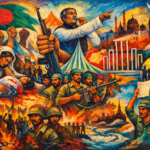Introduction:
As Bangladesh marks its 52nd Victory Day anniversary, the nation stands as a testament to its people’s resilience, sacrifice, and indomitable spirit. December 16, 1971, signifies not only the birth of a nation but also the culmination of a harrowing struggle for independence, where the Bengali people faced unspeakable atrocities at the hands of the Pakistani army. Today, as the nation celebrates its freedom, the scars of 1971 remain etched in the collective memory of the 20 million Bengalis who endured the horrors of war. Despite the magnitude of sacrifices, the world’s acknowledgement of the genocide is painfully limited, echoing a silent plea for recognition and justice.
The Genesis of Struggle:
The road to independence was paved with the blood of those who dared to dream of a free and sovereign Bangladesh. The heinous acts committed by the Pakistani army during the Liberation War of 1971 are a dark chapter in human history, reminiscent of the Holocaust. An estimated three million lives were lost, and the atrocities included the violation of 800,000 women, leaving an enduring scar on the nation’s psyche. The struggle for independence was not merely a fight for territorial sovereignty but a battle for preserving dignity, human rights, and the right to self-determination.
Nine Months of Agony:
The nine months of freedom fighting were marked by unimaginable hardships, with the Bengali population facing systematic genocide. Villages were razed, families were torn apart, and countless lives were lost. The resilience of the Bengali people shone through as they resisted occupation, cruelty, and injustice. Amidst the chaos, India emerged as a beacon of support, providing crucial assistance that played a pivotal role in the eventual victory.
The Role of India:
India’s support for Bangladesh’s independence was a defining moment in the subcontinent’s history. The Indian Armed Forces, under the leadership of General Sam Manekshaw, played a crucial role in the liberation of Bangladesh. The intervention of the Indian military proved instrumental in tipping the scales in favour of the Bengali freedom fighters, leading to the eventual defeat of the Pakistani forces. The friendship forged between India and Bangladesh during those tumultuous times remains integral to the two nations’ shared history.
Celebrating Half a Century of Freedom:
As Bangladesh commemorates 52 years of independence, the achievements and progress made by the nation are commendable. Bangladesh has emerged as a resilient and dynamic nation, from rebuilding war-torn infrastructure to fostering economic growth. The vibrant culture, rich heritage, and warmth of its people are a testament to the strength that arises from adversity.
The Unrecognised Genocide:
Despite the enormity of the atrocities committed during the Liberation War, the international community’s recognition of the genocide remains limited. The world, at large, seems to have turned a blind eye to the pain and suffering endured by the Bengali people. The lack of acknowledgement on a global scale is a profound injustice akin to the silence surrounding the Holocaust. The scars of 1971 continue to haunt the minds of 20 million Bengalis, demanding recognition and justice for the victims.
The Lingering Heart Murmur:
The unresolved issue of recognition perpetuates a lingering heart murmur in the minds of Bangladeshis worldwide. The pain and trauma of the past persist, and the call for acknowledgement reverberates through the generations. The international community must recognise the atrocities committed during the Liberation War, not only for the sake of historical accuracy but also to honour the memory of those who sacrificed their lives for the cause of freedom.
Conclusion:
Bangladesh’s 52nd Victory Day is a poignant reflection, remembrance, and celebration moment. The nation has come a long way since its birth, overcoming immense challenges to establish itself as a thriving democracy. However, the scars of 1971 linger, and the world’s failure to recognise the genocide remains a stain on the pages of history. As Bangladesh moves forward, the sacrifices of the past must be acknowledged, ensuring that the voices of the victims are heard and that justice prevails. The story of Bangladesh’s victory is not only a testament to the resilience of its people but also a plea for a world that values truth, justice, and the dignity of every human life.







Daher sollten Spieler sicherstellen, dass sie ausschließlich bei lizenzierten und
regulierten Online-Casinos spielen, um ein sicheres und
legales Spielerlebnis zu gewährleisten. Dieser Vertrag ermöglicht es Online Casinos,
eine deutsche Glücksspiellizenz zu erwerben und ihre Dienste legal
anzubieten, sofern sie bestimmte Kriterien erfüllen. Deutschlandcasinos.org bietet dir wertvolle Informationen und Ratschläge, um deine Erfolgschancen im Casino zu steigern. Bevor Sie
sich Hals über Kopf in einem beliebigen Online Casino registrieren,
sollten Sie sich erst einmal umschauen, welches Casino eigentlich den besten Willkommensbonus bietet.
Slots, Live, Tischspiele und exotische Namen füllen das Portfolio.
Beste Casinos online verfügen über lukrative Boni für Neu-
und Bestandskunden. Beste Online Casinos bieten oftmals
Apps an, die kostenlos heruntergeladen werden können. Die Wahl zwischen einem Casino-
oder Sportwettenbonus beim Einstieg sowie die Unterstützung
von Kryptowährungen. Die Spielauswahl ist groß, Bonusangebote sind reichlich und Zahlungen flexibel.
Tatsächlich gibt es Freispiele, Cashbacks und VIP-Vorteile,
die das Spielen lohnender machen. Manche Plattformen bieten jedoch gezielt Slots
mit besonders hohem oder niedrigem RTP an.
References:
https://online-spielhallen.de/beste-online-casinos-2025-empfehlungs-guide/